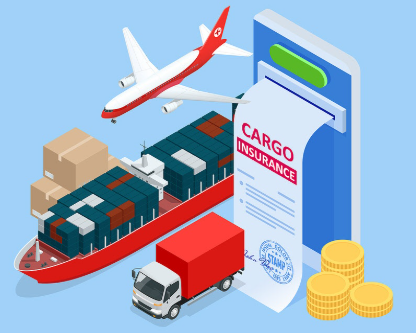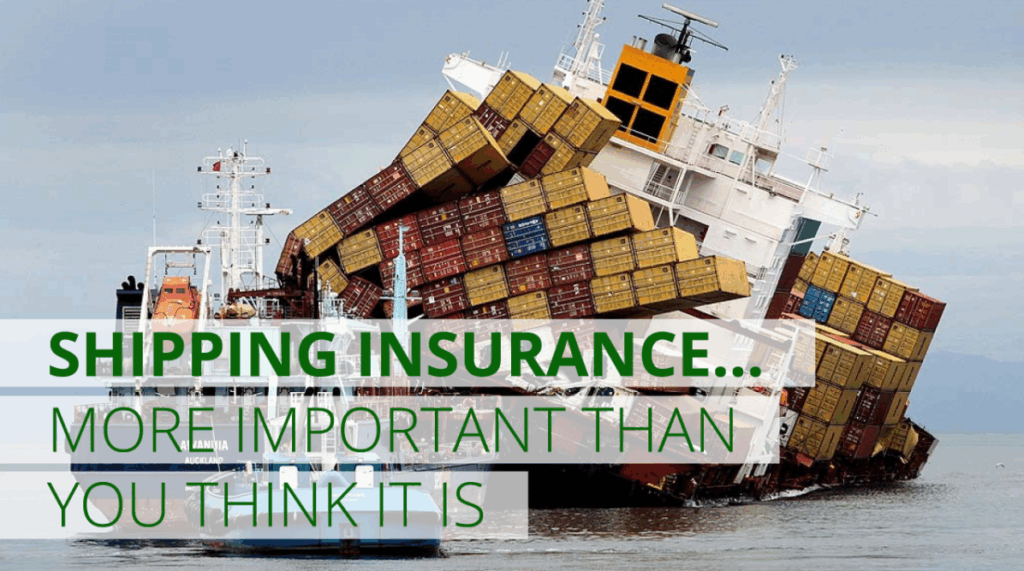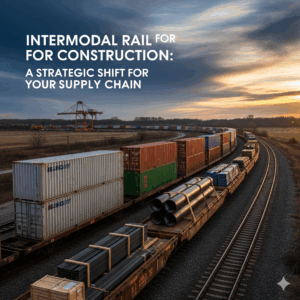Why Freight Insurance Is a Strategic Must-Have in 2025
In the complex and ever-evolving world of logistics, one factor remains constant: risk. Freight shipments, whether domestic or international, face a myriad of potential hazards that can disrupt supply chains, cause financial loss, and damage reputations. That’s why freight insurance is becoming a critical tool for smart shippers in 2025, offering peace of mind, protecting investments, and ultimately boosting profitability.
As global trade volumes rise and supply chains become more interconnected, the stakes for protecting goods in transit have never been higher. Modern shippers face risks such as cargo damage, theft, delays, natural disasters, and even cyber threats. While carriers do provide some liability coverage, it’s often limited and insufficient to cover the full value of goods or consequential losses. This gap makes freight insurance essential for businesses seeking to safeguard their freight and financial stability.
This comprehensive guide will explain why freight insurance is a must-have for today’s logistics strategies, outline the types of coverage available in 2025, and show how it can help shippers minimize risk, comply with regulations, and improve their bottom line.
The Rising Importance of Freight Insurance in 2025
The logistics landscape in 2025 is more challenging than ever. Supply chains are under pressure from ongoing disruptions like port congestion, labor shortages, geopolitical tensions, and climate change impacts. These factors increase the likelihood of freight loss or damage and elevate the cost of such incidents when they occur.
Many businesses have learned the hard way that relying solely on carrier liability or self-insurance exposes them to unnecessary risk. For example, standard carrier liability is often capped at low limits per shipment, and it rarely covers indirect losses such as lost sales or penalties due to late delivery.
In response, freight insurance is gaining traction as a proactive risk management solution that smart shippers use to protect their cargo comprehensively. It offers coverage for a wide range of risks including theft, damage, loss, delays, and even force majeure events like natural disasters.
For companies operating in Canada and beyond, freight insurance provides confidence to invest in larger or higher-value shipments, expand into new markets, and negotiate contracts with more favorable terms.
What Is Freight Insurance and Why Is It Essential?
At its core, freight insurance is a specialized insurance policy that covers goods while in transit—from the moment they leave the warehouse until they arrive at their destination. It supplements the limited liability coverage carriers provide and protects shippers from bearing the full brunt of loss or damage.
The key reasons smart shippers rely on freight insurance include:
- Full Value Protection: Freight insurance typically covers the replacement cost or actual cash value of lost or damaged goods, rather than limited carrier liability.
- Coverage for All Modes: Whether shipping by truck, rail, air, or sea, freight insurance policies can be tailored to cover diverse transportation modes.
- Risk Transfer: It shifts financial risk from the shipper to the insurer, stabilizing cash flow and reducing unexpected expenses.
- Compliance and Contractual Requirements: Many contracts, especially in international trade, require proof of insurance to mitigate liability disputes.
- Peace of Mind: Knowing that shipments are protected allows businesses to focus on growth without the distraction of potential losses.
In 2025, as shippers navigate complex logistics chains and volatile market conditions, freight insurance is becoming a non-negotiable part of a smart shipping strategy.
Freight Insurance and the Bottom Line: More Than Just Protection
Beyond risk mitigation, freight insurance plays a strategic role in enhancing business profitability. Here’s how:
- Enables Larger Shipments: With insurance coverage, companies can confidently increase shipment size and value, taking advantage of economies of scale.
- Reduces Financial Volatility: Insurance payouts cover unexpected losses, preventing cash flow disruptions and costly write-offs.
- Improves Customer Trust: Shippers who protect their freight demonstrate professionalism and reliability, which can strengthen client relationships and lead to repeat business.
- Supports Regulatory Compliance: Insurance facilitates compliance with international trade laws and import/export requirements, avoiding costly fines or shipment holds.
- Lowers Insurance Premiums Over Time: Businesses with consistent coverage and good claims histories can negotiate better rates and reduce overall logistics costs.
Freight insurance transforms from a cost center into a value driver for smart shippers who integrate it into their overall risk management and financial planning.
How to Choose the Right Freight Insurance Provider in 2025
The market for freight insurance in 2025 is competitive, with many insurers offering specialized policies tailored to different industries and cargo types. When choosing a provider, shippers should consider:
- Industry Experience: Look for insurers with expertise in your product category and shipping routes.
- Policy Flexibility: The ability to customize coverage terms and limits is essential to meet your unique needs.
- Claims Process: A fast, transparent claims process reduces downtime and supports smooth recovery.
- Global Network: For international shipments, access to global adjusters and partners is critical.
- Competitive Pricing: Balance premium costs with the value and scope of coverage offered.
Working with logistics partners or brokers who understand freight insurance can help you navigate options and secure the best policies.
Freight Insurance Is a Smart Investment for 2025 and Beyond
As supply chains become more complex and risks multiply, smart shippers are recognizing that freight insurance is not an optional expense—it’s a strategic necessity. It protects your cargo’s value, ensures financial stability, and enhances operational resilience. In 2025, leveraging the right freight insurance can be the difference between a costly disruption and a smoothly managed logistics operation.
For businesses shipping across Canada and globally, embracing freight insurance is a forward-thinking move that supports peace of mind and profit growth. Whether you’re shipping by rail, truck, air, or sea, taking control of your freight risk management with insurance coverage is an essential step toward smarter, safer, and more profitable shipping in 2025.

1. The Financial Risks Are Just Too High
Let’s say you’re shipping $100,000 worth of electronics from Toronto to Vancouver. If the shipment is lost or damaged and not insured, you might assume the carrier will cover the loss. But here’s the reality: freight insurance is critical, as most carriers operate under limited liability, with coverage that can be shockingly low.
In Canada, truck and rail carriers often limit liability to $2 per pound. So if your 1,000-pound shipment is damaged in transit, you’d only recover $2,000—leaving you to absorb a $98,000 loss. Even if you ship freight valued at $10,000, one uninsured incident could erase months of profit.
2. Carrier Liability Is Designed to Protect the Carrier—Not You
Many business owners assume carrier coverage is “good enough.” Unfortunately, that’s a costly misconception. Carrier liability is built around outdated valuation models, governed by decades-old regulations, and heavily skewed in the carrier’s favor.
Carriers aren’t required to insure the value of your goods—they’re only liable under very specific conditions, and often only after lengthy claims processes. Worse yet, if the damage was caused by something outside the carrier’s control—like weather, theft, or vandalism—they may owe you nothing, proving freight insurance is essential.
3. Cargo Theft, Damage, and Delays Are All Increasing
Freight theft in Canada is becoming more organized and more expensive. High-value items such as electronics, designer clothing, pharmaceuticals, and food products are top targets. Thieves have even staged fake pickups or intercepted shipments en route.
Meanwhile, climate-related disruptions—floods, wildfires, snowstorms—are impacting both rail and road-based shipping routes more frequently. Even a short delay can lead to spoilage, penalties for late delivery, or lost customer trust.
With freight insurance, you’re covered in the event of:
- Theft or hijacking
- Accidental damage
- Acts of God (weather and natural disasters)
- Equipment failure
- Lost or delayed cargo
This coverage turns uncertainty into predictable risk management—and that’s a huge win in today’s volatile logistics environment.

4. Customers Expect Safe, On-Time Delivery
In 2025, customers don’t just expect delivery—they expect safe, reliable, transparent delivery. Whether you serve retailers, manufacturers, or consumers, your reputation depends on your ability to ship without issue.
Offering insured shipping demonstrates professionalism and builds trust. It also gives your team the confidence to scale into new markets or take on high-value clients. Some businesses even use insured delivery as a premium service, allowing them to charge more while reducing liability.
5. Protect Margins and Preserve Cash Flow
Logistics isn’t just a line item—it’s a major cost center. And one bad shipment can blow up your margins. Freight insurance acts like a financial shock absorber, allowing you to continue operating—even if something goes wrong.
When you’re scaling, protecting your cash flow is critical. Insurance helps you avoid sudden out-of-pocket losses, giving your finance team more control and your operations team more confidence. Over time, this creates a more resilient and profitable business model.
Bonus: Insurance Is Simpler and More Affordable Than Ever
At RailGateway.ca, we make it easy to integrate freight insurance into your shipping process. Whether you ship intermodal rail, truckload, or LTL, our platform allows you to add insurance with just a few clicks—no paperwork, no waiting. Rates are competitive, claims are straightforward, and support is always available.
The Bottom Line
As we’ve explored throughout this guide, freight insurance is far more than just a safety net for shipments—it is a fundamental component of modern logistics strategies that enables shippers to navigate the uncertainties of 2025 with confidence and control. In today’s fast-paced and interconnected global supply chain environment, the importance of freight insurance cannot be overstated. It safeguards your cargo’s value, supports financial stability, and empowers your business to grow sustainably.
The transportation sector faces unique challenges that directly impact freight security. From unpredictable weather events, increasing freight theft incidents, and rising port congestions to regulatory complexities and supply chain disruptions, the risks are real and often costly. Without comprehensive freight insurance, these risks can translate into severe financial losses, operational delays, and damage to business reputation.
Protecting Your Freight Investment from Unexpected Losses
One of the most compelling reasons to prioritize freight insurance in 2025 is the protection it offers against unexpected losses. While carriers provide some liability coverage, it is often minimal and limited in scope. Carrier liability typically does not cover the full commercial value of goods, nor does it include consequential losses such as missed sales, contractual penalties, or replacement costs.
By contrast, freight insurance policies can be tailored to cover the full replacement value of cargo, offering peace of mind to shippers regardless of whether they transport high-value electronics, perishable food products, industrial equipment, or retail goods. This comprehensive protection ensures that a single incident—be it theft, damage, or natural disaster—won’t derail your business financially.
In the current 2025 environment, where supply chain resilience is tested by geopolitical tensions and climate impacts, investing in freight insurance is an essential risk management tactic.
Minimizing Business Disruptions and Enhancing Supply Chain Resilience
Beyond protecting the monetary value of freight, freight insurance plays a crucial role in minimizing business disruptions. Delays, damage, or loss of goods can halt production lines, delay order fulfillment, and weaken customer trust. The cost of downtime can far exceed the value of the goods themselves, especially in just-in-time (JIT) manufacturing or e-commerce fulfillment.
With freight insurance in place, shippers can recover faster and maintain supply chain continuity. Insurance payouts can cover expedited shipping costs for replacements, storage fees, and other related expenses, reducing the operational impact of freight issues.
This risk transfer mechanism improves supply chain resilience by ensuring that businesses can absorb shocks without compromising service levels or profitability.
Navigating Regulatory and Contractual Requirements with Confidence
In 2025, compliance with increasingly complex regulatory frameworks is a growing concern for shippers. Many international trade agreements, customs authorities, and logistics contracts require proof of freight insurance as a condition of shipment.
Having the right insurance coverage simplifies regulatory compliance, reduces the risk of shipment delays at customs, and strengthens your position in contractual negotiations. For exporters and importers, demonstrating insured shipments enhances credibility with partners and clients alike.
Freight insurance also supports compliance with emerging ESG standards, as risk management practices are now integral to corporate sustainability and governance frameworks.
Unlocking Business Opportunities and Competitive Advantages
Smart shippers understand that freight insurance is not just about protection—it’s also about enabling growth. By mitigating financial risk, businesses can confidently pursue new market opportunities, scale shipment volumes, and invest in higher-value freight.
Insurance-backed shipping also enhances customer trust and satisfaction. Clients prefer partners who show they take risk management seriously and guarantee delivery security. This reputational advantage can differentiate your business in crowded markets.
Moreover, insurers often provide risk assessment and cargo tracking tools as part of their service packages. These value-added services help shippers optimize their logistics operations, further enhancing efficiency and cost savings.
Choosing the Right Freight Insurance Partner
Selecting the right freight insurance provider is critical to maximizing these advantages. Leading insurers in 2025 offer flexible policies that accommodate diverse cargo types, shipping modes (truck, rail, air, sea), and transit routes.
Look for providers who offer:
- Customized Coverage: Tailored policies that fit your specific shipment profiles and risk tolerance.
- Responsive Claims Handling: Fast, transparent claims processes that minimize disruption.
- Global Reach: Networked support for international shipments with expertise in cross-border regulations.
- Competitive Pricing: Balancing affordable premiums with comprehensive coverage.
- Technology Integration: Tools for shipment tracking, risk monitoring, and data analytics.
Partnering with a knowledgeable broker or logistics expert can help you navigate options and secure the best freight insurance for your needs.
Future Trends in Freight Insurance You Should Watch
As supply chains evolve, so does the freight insurance landscape. Some trends shaping the market in 2025 include:
- Digital and IoT-Enabled Insurance: Real-time cargo tracking and condition monitoring integrated with insurance claims for faster and more accurate settlements.
- Parametric Insurance: Coverage that triggers automatic payouts based on predefined events (e.g., weather or delay thresholds), reducing claims processing times.
- Sustainability-Linked Policies: Insurance products that reward shippers for reducing emissions or using eco-friendly transport modes.
- Cyber Risk Coverage: Addressing new risks related to digital supply chain disruptions and hacking incidents.
Staying informed about these innovations will help you leverage freight insurance not only as protection but as a strategic asset in your logistics toolkit.
Final Thoughts: Freight Insurance Is a Strategic Imperative in 2025
In conclusion, freight insurance is a cornerstone of smart shipping in 2025. It protects your valuable cargo from loss and damage, reduces financial uncertainty, ensures regulatory compliance, and enhances your ability to scale and compete in dynamic markets.
By integrating freight insurance into your supply chain management, you gain peace of mind and a powerful tool to safeguard your business’s profitability and reputation. In a world where logistics challenges are becoming more complex and costly, freight insurance stands out as a cost-effective, strategic investment that delivers measurable returns.
How RailGateway Can Help You Optimize Freight Insurance and Shipping in Canada
For Canadian businesses looking to maximize the benefits of freight insurance alongside smart transportation solutions, RailGateway offers unparalleled expertise and service. As a leading freight brokerage and logistics partner, RailGateway specializes in intermodal rail shipping, trucking, and end-to-end freight management across Canada and North America.
RailGateway’s team works closely with shippers to:
- Evaluate your freight risks and recommend the best insurance coverage options tailored to your cargo and routes.
- Integrate freight insurance with efficient rail and truck shipping solutions to optimize costs and transit times.
- Provide access to trusted insurance providers with competitive rates and responsive claims support.
- Offer technology-enabled tracking and visibility tools to monitor your shipments and manage risk proactively.
- Support compliance with cross-border regulations and contractual insurance requirements.
By partnering with RailGateway, Canadian shippers gain a trusted advisor who understands the nuances of freight insurance and shipping logistics—helping you protect your cargo, reduce costs, and grow your business in 2025 and beyond.
Protect your shipments and boost your bottom line with smart freight insurance strategies—contact RailGateway today or visit railgateway.ca to learn more about how we can help you ship smarter and safer in 2025.






